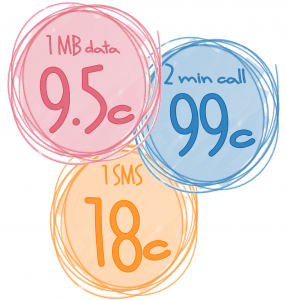 TPG has jumped the gun, in a good way, by introducing unit pricing data to its website well in advance of the 27 October 2012 deadline under the TCP Code. Predictably, the early adopters will blaze the trail for the rest. TPG's post-paid mobile advertising highlights subtle complexities in the Code rules.
TPG has jumped the gun, in a good way, by introducing unit pricing data to its website well in advance of the 27 October 2012 deadline under the TCP Code. Predictably, the early adopters will blaze the trail for the rest. TPG's post-paid mobile advertising highlights subtle complexities in the Code rules.
Starting point: For mobiles, the Unit Pricing Rules apply to 'Included Value Plans' as defined in the Code
We have explained before why the 'dictionary' of defined terms is so important in a legal document. Here's the Code definition of 'Included Value Plan':
Included Value Plan means a mobile Post-Paid Service plan under which the Customer receives a larger amount of monthly included value than the minimum monthly Charge they pay (e.g. for $50 per month, receive $500 included value), to use on a combination of eligible services across Standard National Mobile Calls, Standard National Mobile SMS and national data usage, and the use of any of these three eligible services is not unlimited.
There's a critical element in this definition. To count as an 'Included Value Plan', a plan must offer a dollar amount of value that can be 'spent' on calls, SMS and data. The idea of unit pricing is that you then inform customers of the rate at which one 2 minute call, or one SMS, or 1MB of data, will (a) 'chew up' the included value dollars and (b) expose you to 'excess use' charges.
But there are other kinds of plan that are similar to the definition, but are clearly not the same as it.
For instance, here's a current TPG plan:
It's similar to an 'Included Value Plan' as defined by the Code but it isn't one. That's because the data allowance isn't part of the included value dollars. It's a separate 1.5GB allowance, not connected to or shared with the calls / SMS allowance. When a customer uses 1MB of data, nothing comes off their included value dollars. What happens is that 1MB comes off their included data.
Also notice that data use is not unlimited. There's no dollar charge for the first 1.5GB but that's the included limit.
Notice the problem that creates and how TPG has handled it
TPG has shown admirable good spirit, we think. It could reasonably argue that the Unit Pricing Rules do not apply to this plan at all. And if they do apply, it could reasonably argue that the 'unit price' of its included data is zero, since using 1MB subtracts zero from the included value dollars.
However, TPG has elected to quote its excess data rate — for usage above the 1.5GB included data value — as the cost of 1MB.
We're not suggesting that excess use rates don't have to be stated
Of course they do. They must be stated as part of the full pricing of a plan.
The question is whether they are relevant to the 'three standard pricing elements' defined and required by clause 4.2.6 of the TCP Code, and whether they need to be 'Prominently Displayed' in 'Text Advertising'.
What's the practical work around?
ACMA considers it would have been fine for TPG to state its unit pricing like this:
- the unit price for a two-minute call is $2.15
- the unit price for a text is 23.5 cents
- the unit price for a MB of data is free for the first 1.25GB and then 25 cents per MB
So ACMA thinks that the obligation to state unit pricing can in fact mean stating two prices for each of calls, SMS and data if 'included use' and 'excluded use' are charged at different rates. That makes some sense, but it isn't explicitly stated in the Code.
And if that's the answer, it doesn't solve other conundrums, such as how unit pricing works for shaped data plans that bundle line rental and local calls.
The lessons
We think that TPG has gone beyond the call of duty with its advertisement. We have criticised TPG for non-compliant advertising often enough in the past, so it's only fair to give credit this time. They have resolved uncertainty in the Code by choosing the outcome that is least favourable to TPG.
The ad also highlights the potential challenges of applying the Code's Unit Pricing Rules to the wide variety of current plans and offers, let alone whatever new products are developed in future.
It also illustrates the important role of ACMA's legal team in working out precisely what this often very vague Code really means. When it comes to enforcement, ACMA can't rely on the 'spirit of the Code' to make it mean something it doesn't really say.



